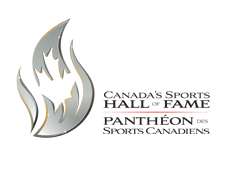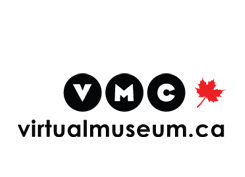Home | Major Sporting Events | British Empire Games/Commonwealth Games
1930 British Empire Games - Hamilton
PreviousNext
The idea of an athletic competition uniting former British colonies as an international community had existed since 1891. However, it was not realized until Melville Marks "Bobby" Robinson, a Canadian sports reporter and athletic organizer, rallied organizers in the late 1920's to pioneer the British Empire Games. M.M. Robinson had witnessed the horrors of the First World War as a Lieutenant with the 19th Canadian Machine Gun Company, an experience that likely influenced his vision of an athletic competition that would unite the British Empire in peace and camaraderie rather than perpetuate "the pressure of international rivalry."
A testament to Robinson's inspired determination, the first British Empire Games was held in Hamilton, Ontario in 1930. The event drew 400 athletes from 11 countries, with men competing in athletics, lawn bowling, boxing, rowing, swimming and wrestling. Women were included, but their participation was limited to swimming events alone. Hosting the nation's first major international multi-sport competition, Canadians rose to the occasion and gave inspiring performances at the inaugural British Empire Games. Especially memorable was sprinter Percy Williams, who persevered to win the 100-yard race after pulling a muscle 30 yards from the finish line. A resounding success, the event sparked a vibrant legacy of diplomacy and goodwill that would in future be revived every four years, gradually evolving into the modern Commonwealth Games.
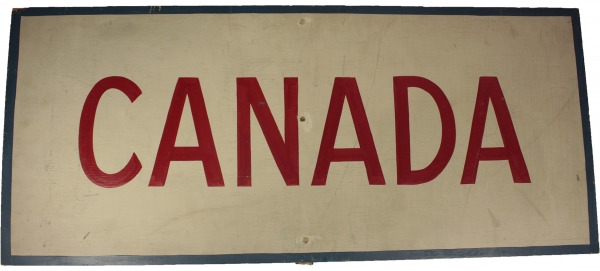
The 1930 British Empire Games Canadian team wore red blazers as they marched in the athletes' parade behind this sign. The 400 competing athletes were housed in the classrooms at a local school or in a hotel for women. They were given the freedom of the city, which included free public transport, admission to cinemas and other privileges.
Collection: Private Collection: M.M. Robinson, on loan from William F. Clark, Executor
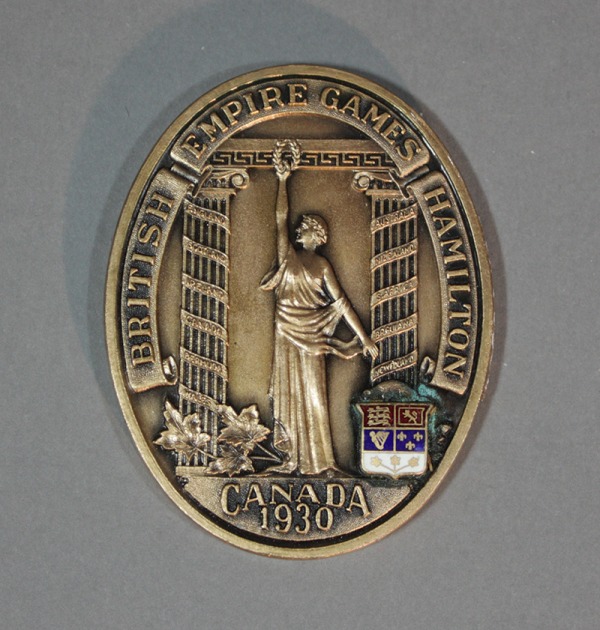
The first edition of the British Empire Games included 11 nations, with Newfoundland participating on its own. Canada is one of six countries to have attended all the subsequent Games. The Games now include 63 nations competing in 10 core sports with up to seven additional sports. Para sports are now fully integrated into the overall sport program. The 1930 medal showed a crowned Victory with the Canadian Coat of Arms.
Collection: Private Collection: M.M. Robinson, on loan from William F. Clark, Executor
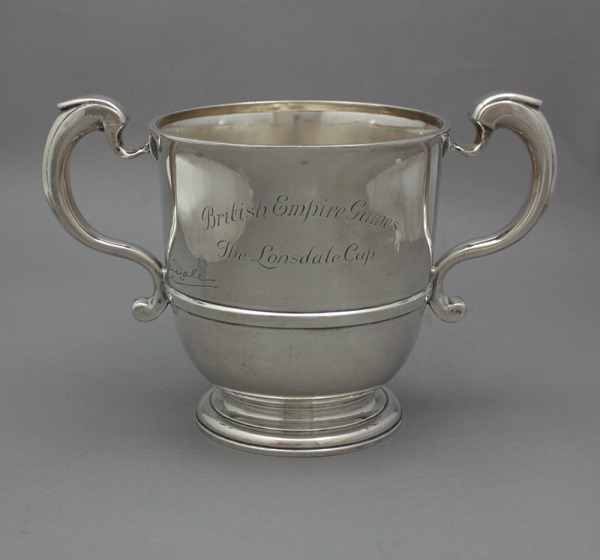
The Earl of Lonsdale presented a trophy at the Festival of the Empire in 1911 that celebrated the coronation of King George V. The original Cup, which was won by Canada, was melted down and made into smaller copies for the Empire Games Association for the participating nations. The Canadian Cup, called the Lonsdale Cup, was gifted to M.M. Robinson.
Collection: Private Collection: M.M. Robinson, on loan from William F. Clark, Executor
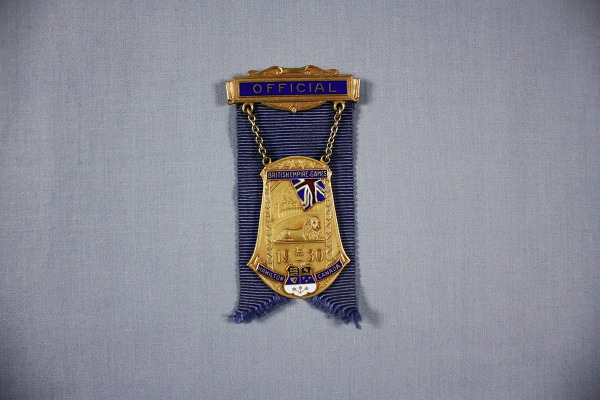
The 1930 British Empire Games were the first major international multi-sport competition in Canada. Hamilton provided the facilities which included a pool and the civic centre later named Ivor Wynne Stadium. Canadians were among the officials and Fred Marples officiated at the athletic events as he had at the 1928 Olympic Games. His badge included an enameled Union Jack and Canada Coat of Arms.
Collection: Canada's Sports Hall of Fame
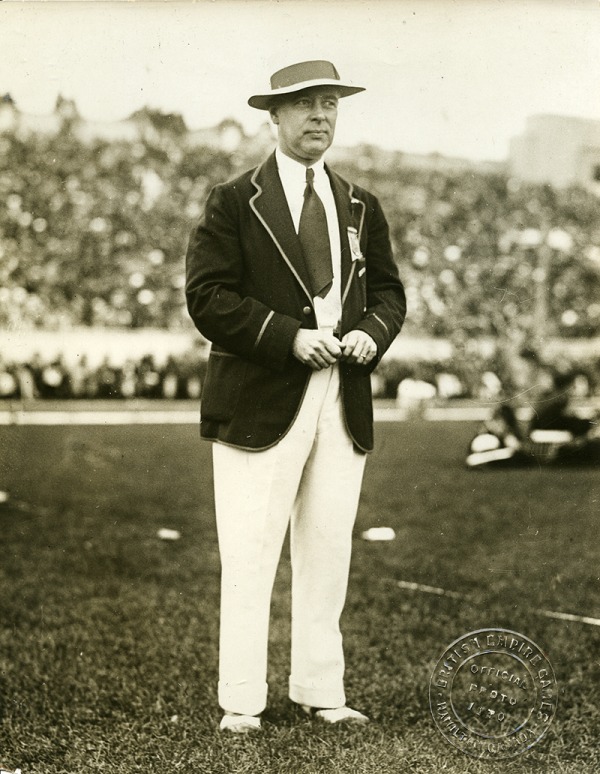
M.M. "Bobby" Robinson was a resourceful promoter for the concept of the British Empire Games. His lobbying convinced the City of Hamilton to not only build sport facilities but to also help cover travel costs of distant teams. His commitment to sport as a means of promoting friendship is an enduring legacy of the Commonwealth Games today.
Collection: Private Collection: M.M. Robinson, on loan from William F. Clark, Executor
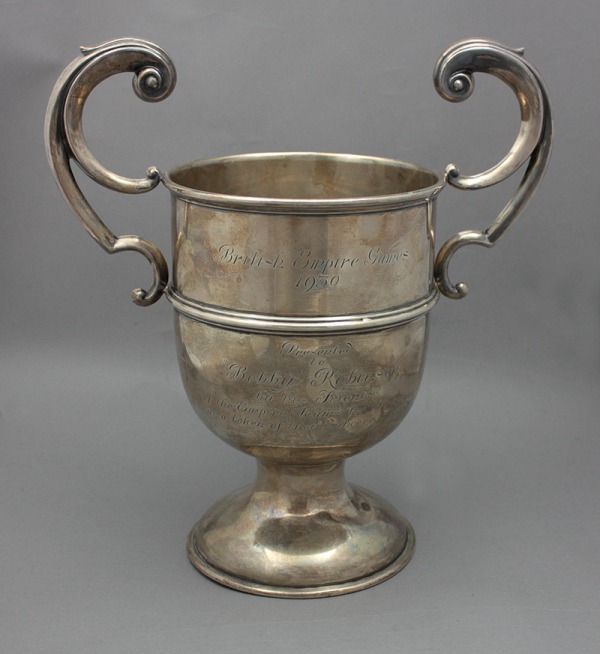
Support for the British Empire Games was strong among the other dominions but not so in England. It took a good deal of persistence in the face of England's fear that the British Empire Games would be a rival to the Olympic Games to win this country over. Robinson's passion and sense of community was acknowledged by the other nations when they presented him with this silver cup.
Collection: Private Collection: M.M. Robinson, on loan from William F. Clark, Executor

Percy Williams astonished the world when he won two Gold medals in the sprint events at the 1928 Olympic Games. Under the management of M.M. Robinson, the Canadian track team brought home a total of eight medals. Although his competitive career was short, Percy Williams brought pride and renown to a young country.
Collection: Canada's Sports Hall of Fame
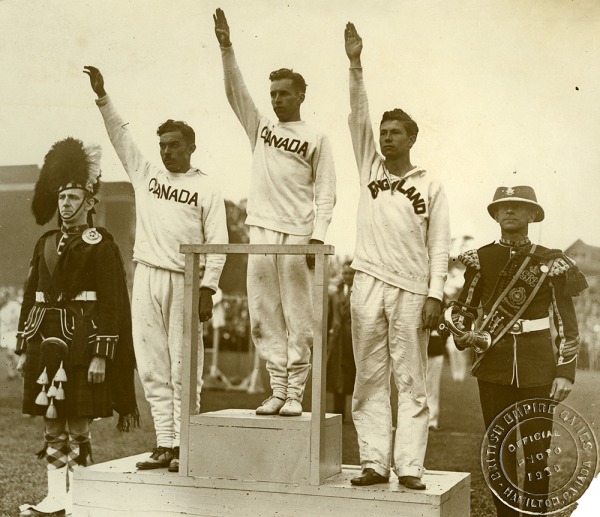
Percy Williams took the oath of allegiance on behalf of the competitors at the 1930 British Empire Games. He set a long-standing Games record when he ran the 100-yard dash in a record 9.6 seconds in a heat. His will and determination showed in his final race which he won despite an injury.
Collection: Canada's Sports Hall of Fame
Previous Next
